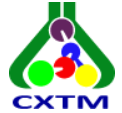Speaker
Description
The aim of this work was to develop and validate a stability-indicating reversed phase high performance liquid chromatography (RP-HPLC) method with UV-detection for quantitative determination of related and degradation products of active pharmaceutical ingredient (API) in tablet formulation. Phosphate buffer at pH 7.0, at which the active compound is stable and exists in its molecular, un-ionized form was chosen as aqueous part of the mobile phase, whereas octadecylsilyl silica was selected as stationary phase. As organic modifier, initially acetonitrile was chosen, but in order to solve a problem with separation and retention stabilization of an excipient in the formulation – organic colour erythrosine, using a mixture of acetonitrile and methanol was necessary. The addition of methanol in the organic modifiers mixture causes change in selectivity,1 that affects several components present in the formulation through different mechanisms (hydrogen bonding, overcoming steric restrictions).
After optimization, which includes creating a gradient elution program, the method was successfully validated according to ICH guideline Q2(R1). The robustness of the method has been evaluated using Plackett-Burman experimental design and the results showed fulfilment of the selected system suitability criteria inside the created design space.
Keywords: related and degradation products, HPLC-UV, selectivity, organic modifier
References:
1. Engelhardt H., Kilmek-Turek A., Dzido T.H. The effect of modifier on selectivity in reversed-phase high performance liquid chromatography. LC GC Europe 2008, 21(1)33-42



